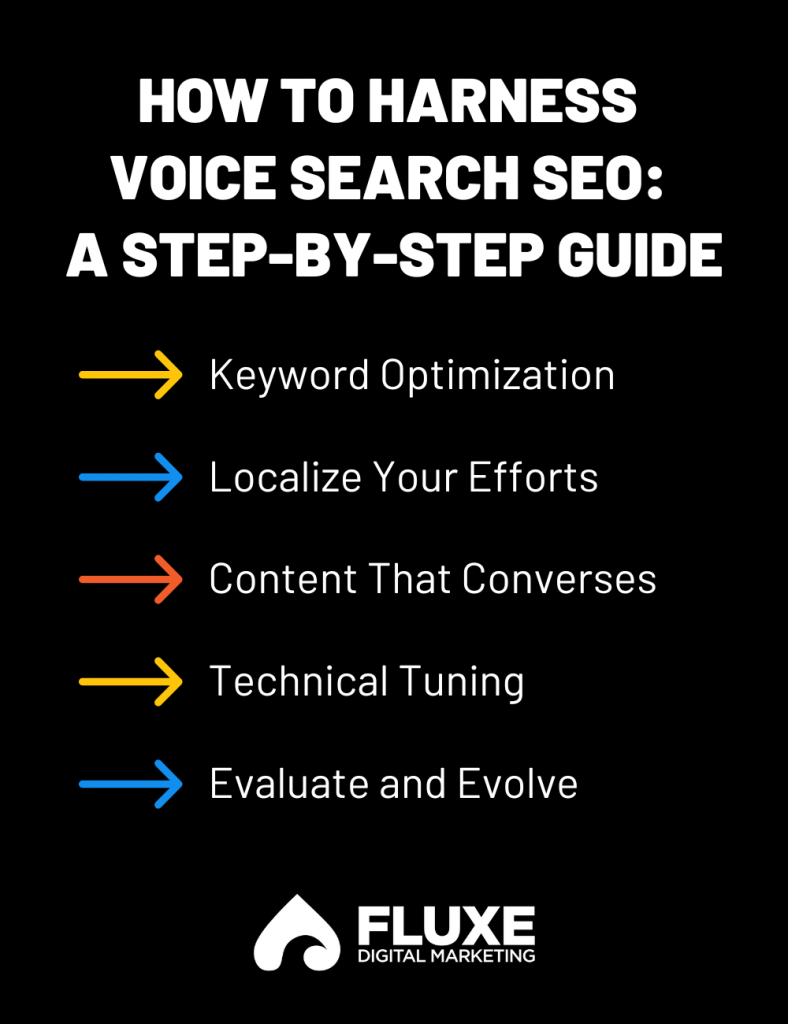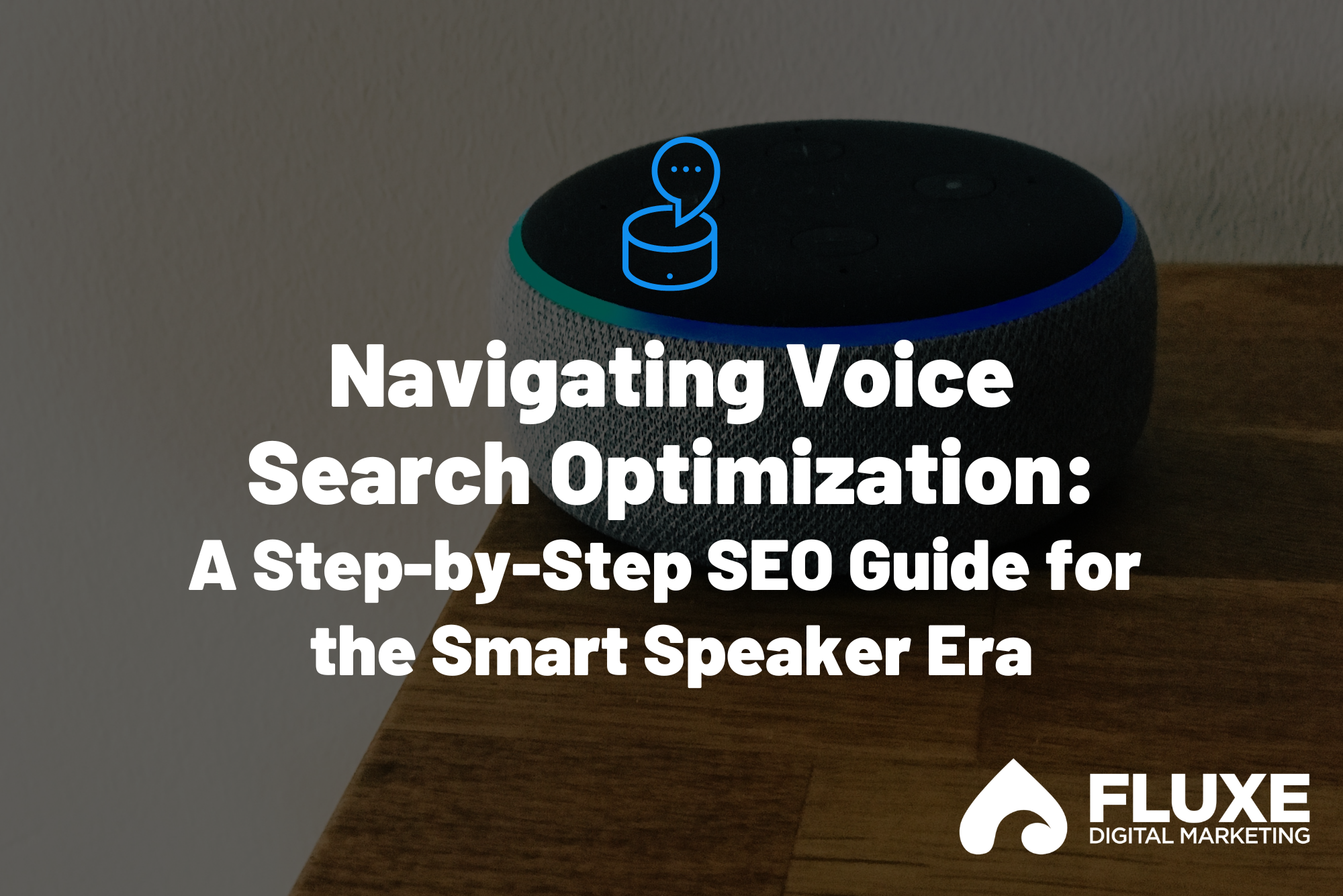The human voice is intimate, immediate, and incredibly powerful. And now, it’s reshaping the SEO landscape.
The growth of voice-activated searches through smart speakers, phones, and other devices isn’t just inevitable — it’s already happening. Your business’s future hinges on adapting to this new norm, where convenience is king and the spoken word reigns supreme.
Here, we’ll explain voice search SEO and offer thoughtful strategies to ensure your business finds a loyal audience.

The Evolution of Voice Search in SEO
The digital assistant began as a novelty. Fast forward a few years, and it feels less like science fiction and more like daily interaction. Now that smart speakers occupy a significant portion of American homes, keywords are no longer just typed but spoken, with users expecting instant, accurate results.
As this technology has matured, so has our thinking about SEO. Conventional keyword strategies won’t cut it if you want to reach the consumer who’s cooking dinner while asking Alexa to find a local Italian market. We have to refine our approach, steering toward natural language and long-tail keywords that mirror voice queries’ conversational tone.
Understanding Voice Search Behavior
People speak differently than they type. Voice search queries are longer, more nuanced, and phrased as questions. This shift requires a breed of SEO that’s closer to how we communicate.
Your clients ask their digital assistants for recommendations, locations, and solutions. Understanding this behavior is key to optimizing your content. You need to anticipate their verbal questions and provide concise, direct answers that a digital assistant can easily procure.
Voice Search SEO: Key Strategies
Optimize for Local SEO
“Hey, Siri, where’s the nearest digital marketing conference?”
For local businesses, voice search is a golden opportunity. Local SEO hinges on being the answer to location-based queries. Optimize for local by claiming your Google My Business listing, ensuring your NAP (Name, Address, and Phone Number) details are consistent across the web, and embedding location-specific keywords within your digital content.
Adapt Website Content
The cornerstone of voice search optimization is creating content that answers your audience’s questions.
Let’s say you’re a concierge doctor. Your prospective patients might ask, “What’s the best concierge medical service near me?” Your content must directly address this question.
But it’s not just about the queries. It’s also about the format. Quick, digestible, and direct is the way to go. Think bullet points, structured snippets, and clear headlines.
This isn’t “dumbing down.” It’s smartening up your content for AI comprehension and user satisfaction.
Enhance Technical SEO Elements
Speed matters. If Alexa has to wait for your site to load, you lose the race before it begins. Site speed and mobile friendliness are crucial for voice search optimization, as many voice searches come from mobile devices.
Don’t forget schema markup, too. It’s like a roadmap for search engines, directing them to the most critical parts of your site and content. When you facilitate search engines’ understanding of your page content, they can more effectively match it to voice search queries.
Use Voice Search Optimization Tools
Even SEO veterans need a compass now and then. Take advantage of new tools that offer insight into voice search keywords and trends. Knowing which questions are being asked and how they’re phrased is half the battle.
Artificial intelligence and machine learning tools are particularly important here, offering predictive capabilities and deeper analysis of search patterns. They’re not just tools in your arsenal. They’re allies in your quest to tap into the voice search domain.

How to Harness Voice Search SEO: A Step-by-Step Guide
Let’s get practical. You want to optimize your keywords for voice search. Now what?
- Keyword Optimization: First, identify long-tail keywords that mirror natural speech. Use tools designed for voice SEO to understand the questions your audience asks and frame your content around them.
- Localize Your Efforts: Ensure your business connects to people asking for services in your area. Use Google’s location-based services and make sure your online listings are comprehensive and consistent.
- Content That Converses: Write content that speaks. FAQs, answer boxes, and conversational blog posts are effective formats. Write like you speak, because that’s how your audience is searching.
- Technical Tuning: Make sure your website is up to snuff. It needs fast load times, mobile optimization, and structured data. This ensures search engines and smart devices can process and present your content without friction.
- Evaluate and Evolve: This isn’t a one-time setup. Keep testing and tweaking. Voice search, like all tech, evolves. Stay attuned to the trends and remain flexible in your approach.
Future Trends in Voice Search Optimization
Voice search isn’t stationary; it’s growing, developing, and finding new directions. Features like context recognition and personalized responses are likely on the horizon, so now is the perfect time to position your business where the puck will be, not where it has been.
Complexity, nuance, and anticipation for what’s next will position your voice search SEO strategy for long-term efficacy.
Final Thoughts on Voice Search SEO
At Fluxe Digital Marketing, we see voice search recognition not as a speed bump but as an exciting opportunity. Are you ready to make your business heard? Reach out to our team of content marketing experts today to start a conversation.
It’s not just what you say, but how you say it. Welcome to the new apex of SEO, where your business’s voice carves its path in the digital world.



